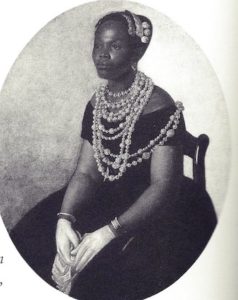
Francisca da Silva de Oliveira
*The birth of Francisca da Silva de Oliveira is celebrated on this date in c. 1732. She was an Afro Brazilian socialite who became eminent for becoming rich and powerful despite being born into slavery.
Francisca was the daughter of a Portuguese man, Antônio Caetano de Sá, and an enslaved African woman, Maria da Costa, from the Gulf of Guinea or Bahia. The region of Minas Gerais was unique in that it had a fairly diverse population compared to other slave regions on the Brazilian coast, the Caribbean, and the United States. Known as "Francisca Pardo" while enslaved, her first owner was Domingo da Costa, from Milho Verde. She was sold to Sergeant Manuel Pires Sardinha, with whom she had her first son, Simão Pires Sardinha. Francisca's third master was João Fernandes de Oliveira, a diamond mine owner and one of the wealthiest persons in Colonial Brazil. Sources suggest that Francisca was granted her freedom by Fernandes when he bought her in 1753.
After being freed, she officially changed her name (Chica) to Francisca da Silva de Oliveira to erase her history as a slave. This benefited her son to receive the Portuguese title of the Knight of the Order of Christ. Francisca and João soon started a relationship. Despite not being officially married, they lived together for several years and had 13 children. Soon after, she became an independent house owner in Tejuco on Opera Street. The house had many luxuries, including a garden, her chapel, bathtubs, armoires, mirrors, and canopy beds, which were rare in households at the time.
Chica was also the owner of many slaves who both helped her in the house and worked in the mines in the region. Chica also presented herself as flashy to help separate herself from the other dark or mixed people in society. People often showed their status through their material items, which for Chica included her clothing, home, slaves, and name change. By the end of her life, she also included Dona at the beginning of her name for a more respected title.
In 1770, João Fernandes had to return to Portugal and took with him the four sons he had with Chica and Chica's two other sons, who the Portuguese Court granted noble titles. Their daughters remained with Chica in Brazil and were sent to the Convent of Macaúbas. Even after João left, Chica retained her prestige. She was a member of the São Francisco do Carmo Brotherhood (exclusive to whites), Mercês Brotherhood (exclusive to mulattos), and Rosário Brotherhood (exclusive to Africans). Francisca Chica da Silva died in 1796. She was buried at the Church of São Francisco de Assis.
In the eighteenth century, in Brazil, colonizers and slaves were overwhelmingly male. Portuguese men had traveled to Brazil alone to seek wealth, as Portuguese women were often banned from migrating. Due to love affairs and children born between Portuguese men and African and/or mulatta slave women, freed former slaves were predominantly female.
Stereotypes about non-white women were abundant during the colonial period. While gender, race, and color worked together to systemically disadvantage negro women, some individuals, such as Chica, used their perceived hyper-sensuality to invert gender and power relations. Once socially mobile, these women were seen as even more dominant than their masters.